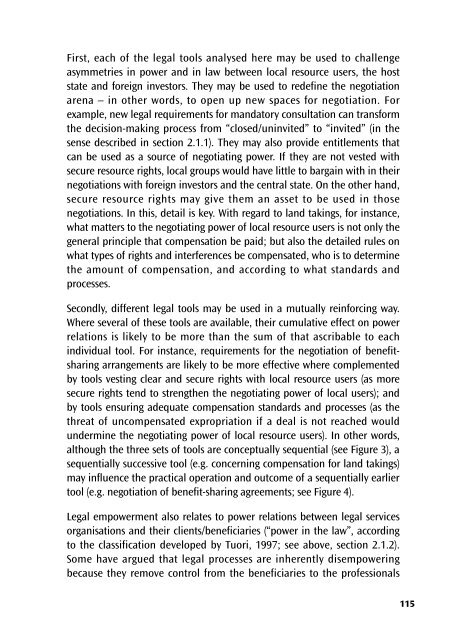Legal empowerment for local resource control
Legal empowerment for local resource control
Legal empowerment for local resource control
Create successful ePaper yourself
Turn your PDF publications into a flip-book with our unique Google optimized e-Paper software.
First, each of the legal tools analysed here may be used to challenge<br />
asymmetries in power and in law between <strong>local</strong> <strong>resource</strong> users, the host<br />
state and <strong>for</strong>eign investors. They may be used to redefine the negotiation<br />
arena – in other words, to open up new spaces <strong>for</strong> negotiation. For<br />
example, new legal requirements <strong>for</strong> mandatory consultation can trans<strong>for</strong>m<br />
the decision-making process from “closed/uninvited” to “invited” (in the<br />
sense described in section 2.1.1). They may also provide entitlements that<br />
can be used as a source of negotiating power. If they are not vested with<br />
secure <strong>resource</strong> rights, <strong>local</strong> groups would have little to bargain with in their<br />
negotiations with <strong>for</strong>eign investors and the central state. On the other hand,<br />
secure <strong>resource</strong> rights may give them an asset to be used in those<br />
negotiations. In this, detail is key. With regard to land takings, <strong>for</strong> instance,<br />
what matters to the negotiating power of <strong>local</strong> <strong>resource</strong> users is not only the<br />
general principle that compensation be paid; but also the detailed rules on<br />
what types of rights and interferences be compensated, who is to determine<br />
the amount of compensation, and according to what standards and<br />
processes.<br />
Secondly, different legal tools may be used in a mutually rein<strong>for</strong>cing way.<br />
Where several of these tools are available, their cumulative effect on power<br />
relations is likely to be more than the sum of that ascribable to each<br />
individual tool. For instance, requirements <strong>for</strong> the negotiation of benefitsharing<br />
arrangements are likely to be more effective where complemented<br />
by tools vesting clear and secure rights with <strong>local</strong> <strong>resource</strong> users (as more<br />
secure rights tend to strengthen the negotiating power of <strong>local</strong> users); and<br />
by tools ensuring adequate compensation standards and processes (as the<br />
threat of uncompensated expropriation if a deal is not reached would<br />
undermine the negotiating power of <strong>local</strong> <strong>resource</strong> users). In other words,<br />
although the three sets of tools are conceptually sequential (see Figure 3), a<br />
sequentially successive tool (e.g. concerning compensation <strong>for</strong> land takings)<br />
may influence the practical operation and outcome of a sequentially earlier<br />
tool (e.g. negotiation of benefit-sharing agreements; see Figure 4).<br />
<strong>Legal</strong> <strong>empowerment</strong> also relates to power relations between legal services<br />
organisations and their clients/beneficiaries (“power in the law”, according<br />
to the classification developed by Tuori, 1997; see above, section 2.1.2).<br />
Some have argued that legal processes are inherently disempowering<br />
because they remove <strong>control</strong> from the beneficiaries to the professionals<br />
115

















